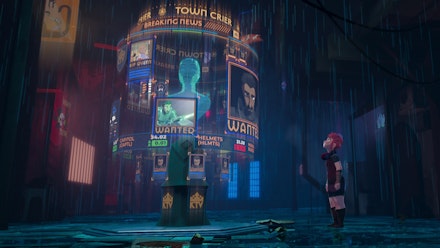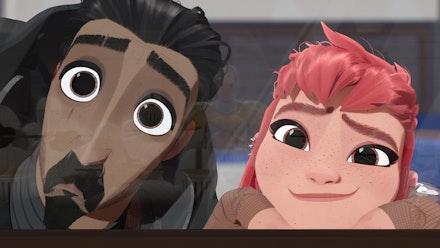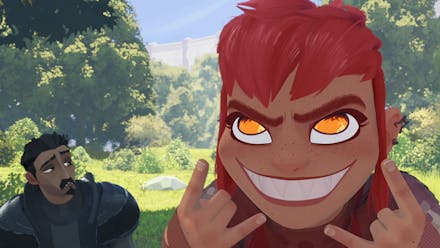Nimona is many things. She’s a rebel. She’s a punk. She’s an instigator, a rabble-rouser, an agent of chaos. She’s a shapeshifter, able to transform into any animal – or any other human – you can imagine. More than anything, though, she’s a survivor. That her story is finally hitting our screens is a minor miracle; Nimona’s arrival on Netflix comes in the wake of studio switcheroos, a crushing cancellation, and a miraculous resurrection. Underestimate her at your peril.
Once upon a time, Nimona was being created by Blue Sky – the animation studio behind the Ice Age franchise and Spies In Disguise – adapted from ND Stevenson’s fairytale-trope-subverting graphic novel. Then it was felled by, of all things, a mouse. When Disney acquired 21st Century Fox, the animation giant soon shut Blue Sky down, cancelling Nimona with it – despite the film reportedly being 75% complete. All was thought lost. But then, in its darkest hour, came a shining knight: Annapurna Pictures, who revived the film at Netflix (albeit not with true love’s kiss).

In the ultimate happily ever after, Nimona proves worth the wait. From this evidence, you can guess why Disney decided not to complete the film – its satirical subversions of the fairytale formula feel spiritually akin to the anarchic outlook of the original Shrek, a direct riposte to decades of didactic narratives and moral conservatism perpetuated by much of Disney’s own back-catalogue. And while Disney itself has made significant strides towards more progressive storytelling in the likes of the Frozen movies, Moana, and especially last year’s Strange World, Nimona’s tonal and narrative edge feels particularly pronounced – it exists in defiance of the legacy of traditional princess stories that have long preceded it. Not to mention, its LGBTQ+ themes are undiluted, present in the very bones of the story as well as being embodied in specific characters.
Nimona herself is a blast, voiced exuberantly by Chloë Grace Moretz, clearly relishing the character’s rebellious spirit.
There’s daring stuff going on beneath the surface. But it’s the surface you’ll first notice – a beautiful blend of 2D-3D hybrid animation, cel-shaded textures, blocky colours, and geometric facial features. Visually, it feels distinct from anything else in the current animation landscape, less radical than Spider-Verse and its ilk, but a stylish embodiment of the film’s sharp, modern outlook (and cartoonish sense of humour). The visual gleam is perfectly suited to Nimona’s distinctive world – a futuristic version of a high-fantasy realm, where daring heroes still don shiny gold armour (it begins with a dramatic turn at the kingdom’s excellently-monikered ‘Night To Knight Knights’) and the legacy of legendary warrior Gloreth lingers, but that over the course of a millennium has become a bustling metropolis in which neon-lit spaceships soar through the sky. That in itself sums up Nimona’s outlook – one foot in the past, the other stepping boldly forward.

Caught between tradition and modernity is Ballister Blackheart (a charismatic Riz Ahmed), not of noble birth but skilled enough to be a rare outsider admitted into the kingdom’s military ranks – until he’s framed for a heinous crime. That he and fellow knight Ambrosius Goldenloin (Eugene Lee Yang) – the direct descendent of Gloreth herself – are in love is portrayed matter-of-factly, though their romance faces considerable obstacles as the plot ploughs forward. On the run and seen by the world as a murderer, Bal is ‘recruited’ by the impish Nimona; more accurately, she presumes to assert herself as his new sidekick, a pair of ‘villains’ ready to live by their own rules.
Nimona herself is a blast, voiced exuberantly by Chloë Grace Moretz, clearly relishing the character’s rebellious spirit – whether devising half-baked heist plans (“Chaos, destruction, something-something-something, we win”), conducting daring escapes by shape-shifting into multiple creatures in quick succession (a sequence to rival a similarly thrilling scene in Dungeons & Dragons: Honour Among Thieves), proving sharks can dance, or deploying her signature deadpan catchphrase: “Metal.” Her irreverence, twisted humour and punk attitude brings multiple laughs – and even informs the soundtrack, peppered with punky alt-pop picks from Santigold and Metric. (It’s also, notably, the second film in which Moretz kicks ass to the sound of The Banana Splits.)
If Nimona occasionally feels a little eager to please early on, it becomes more complex and compelling in the second half as it barrels towards a Princess Mononoke-meets-Pacific Rim finale, boasting genuine narrative twists and ideas about embracing individuality that run more than skin deep. At one point, Nimona laments that kids “grow up believing that they can be a hero if they drive a sword into the heart of anything different.” Her film actively chooses to change that narrative. The un-cancellable, unstoppable, unapologetic Nimona. Some stories simply demand to be told.



